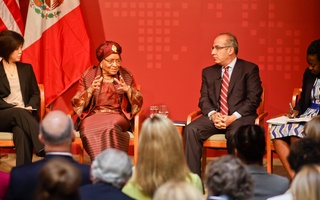
Iris Bohnet, professor of Public Policy at the Kennedy School, discusses the nuances of inclusive organizations at the John F. Kennedy Jr. Forum Tuesday evening. Professor Bohnet shared from her own experience working with various organizations to achieve authentic gender equity.
Iris Bohnet, a professor at the Kennedy School of Government, argued that when it comes to combating gender inequality in the workplace, it is more important to build environments that eliminate the potential interference of prejudice rather than trying to change individuals' mindsets.
Speaking at the John F. Kennedy Jr. Forum on Tuesday, Bohnet said she hopes that the greatest achievement of behavioral design will be “to liberate our minds to see talent for what it really is,” rather than reinforcing human impulses to discriminate based on appearance.
“We are used to certain patterns,” Bohnet said at her talk, which focused on building inclusive organizations. “We are used to seeing male venture capitalists. We are used to seeing female nurses. And we put people into those thoughts.”
Bohnet offered many ways to combat gender biases, and she said the starting point is to be more aware of gender-based prejudice and discrimination.
“Think about the micro-inequities that you or others might be experiencing in your community,” Bohnet said. “Only by doing so will we be able to equalize the playing field in all organizations.”
Another suggestion she made for building inclusive workplaces and organizations was implementing blind evaluations that highlight skills and obscure characteristics like race or gender.
During a question-and-answer session following the talk, some audience members asked how transgender individuals and others who identify as neither male nor female may fit into the discussion.
Chioma Onuoha ’20 said she enjoyed the event but wished it had been more inclusive of those such individuals.
“[Bohnet] focused a lot on just women and didn’t go into the intersection of genders or races,” Onuoha said. “It was still a good conversation to have.”
Read more in News
School of Public Health Partners with Politico for PollingRecommended Articles
-
Take the 'Third Way' at This Moment of OpportunityWe had hoped that the discussion at last Tuesday’s meeting of the Faculty of Arts and Sciences would focus on
-
Bohnet To Serve as Kennedy School Academic DeanKennedy School Women and Public Policy Program Director Iris Bohnet will serve as the school’s Academic Dean beginning July 1, according to a statement released on Thursday.
-
The Cost of ExclusivityThat Harvard students routinely flock to off-campus social spaces belies the fact that Harvard, in truth, owns an abundance of underutilized social space.
-
 Kennedy School Transitions into Public Phase of $500 Million Campaign
Kennedy School Transitions into Public Phase of $500 Million Campaign -
In Defense of SororitiesThis is not to say that sororities are perfect institutions (we aren’t), but that we are an example of what a single-gender organization working towards inclusivity on this campus might look like.













